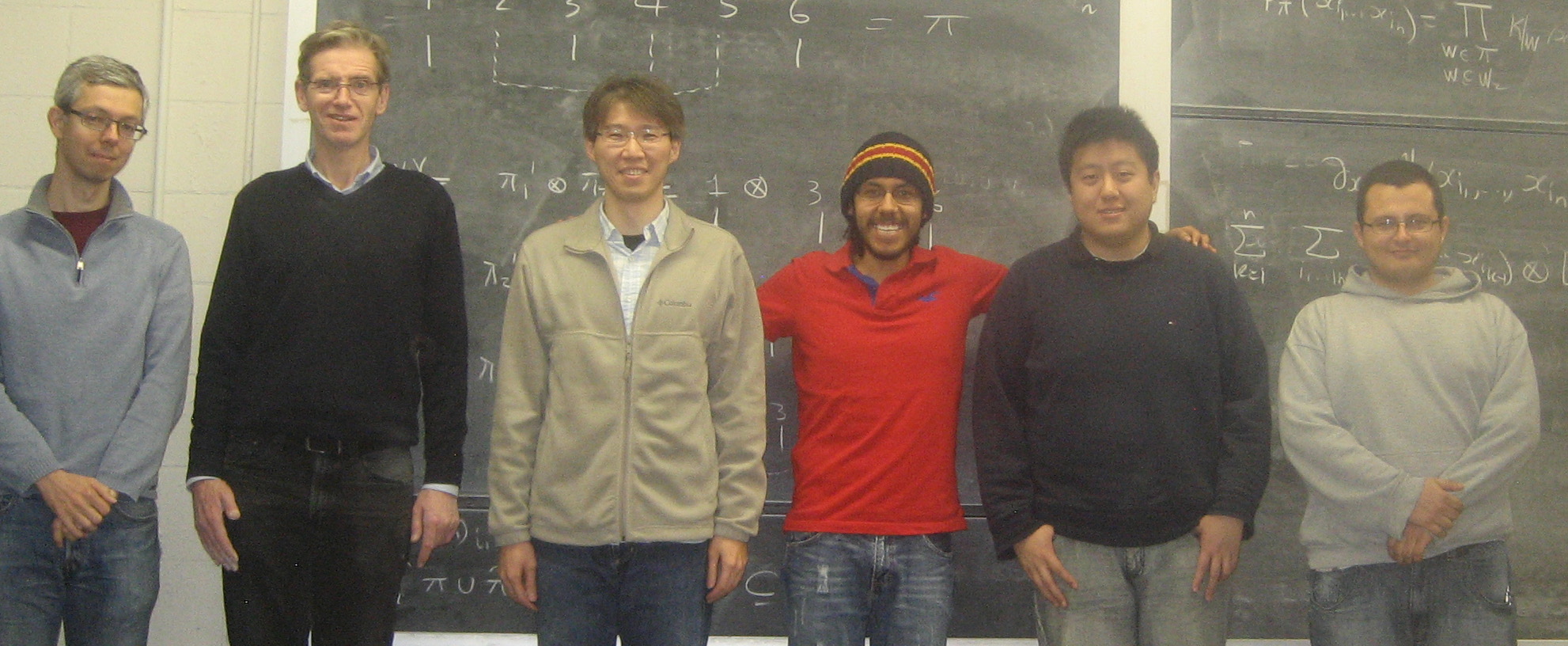 Schedule for Current Term
Schedule for Current Term
Wednesday, December 3, 4:30 - 6:00, Jeff 222
Infinitely divisible matrices and their applications
in free probability theory, IV
Tuesday, November 25, 4:30 - 6:00, Jeff 319
Infinitely divisible matrices and their applications
in free probability theory, III
We will discuss some theorems which characterize
freely infinitely divisible laws in terms of
Voiculescu transforms. Also to be discussed are freely
infinitely divisible laws are characterized via the
free Lévy-Hinčin formula.
Tuesday, November 18, 4:30 - 6:00, Jeff 319
Infinitely divisible matrices and their applications
in free probability theory, II
We will discuss some theorems which characterize
freely infinitely divisible laws in terms of
Voiculescu transforms. Also to be discussed are freely
infinitely divisible laws are characterized via the
free Lévy-Hinčin formula.
Tuesday, November 11, 4:30 - 6:00, Jeff 319
Freeness and the Transpose, II
This will be a continuation from November 3.
Monday, November 3, 5:00 - 6:30, Jeff 102
Freeness and the Transpose
M. Popa and I have shown that a random matrix can be
free from its transpose if it is unitarily
invariant. We have recently taken this one step
further and have shown that for a Wishart matrix one
gets an asymptotically free family consisting of the
original matrix, two partial transposes (left and
right), and the full transpose.
Tuesday, October 21, 4:30 - 6:00, Jeff 319
Infinitely divisible matrices and their applications in free
probability theory
The theory of positive definite matrices, positive definite
functions, and positive linear maps is rich in
content. The notion of infinitely divisible matrices,
a subclass of positive definite matrices, also has
been studied for a long time by R. Horn and
R. Bhatia. These subjects are closely related to
moment sequences, infinitely divisible laws with
respect to classical convolution, and non-commutative
analysis. We will present some of these results and
discuss the applications in free probability theory.
Tuesday, October 14, 4:30 - 6:00, Jeff 319
Josué Daniel Vázquez Becerra (Queen's)
Asymptotic Liberation in Free Probability, II
I will continue from last week.
Tuesday, October 7, 4:30 - 6:00, Jeff 319
Josué Daniel Vázquez Becerra (Queen's)
Asymptotic Liberation in Free Probability
Let $M$ be a finite non-empty set.
Suppose that for each $n \in \mathbb{N}$ we are given a
family $\{B_{n,m}\}_{m \in M}$ of $n$-by-$n$ complex
matrices such that $\displaystyle{ \sup_{n \in \mathbb{N} }
\sup_{m\in M}} \Vert B_{n,m} \Vert < \infty $,
and the limit $\displaystyle{ \lim_{n\rightarrow \infty } }
\frac{1}{n} \mathbf{tr} [ (B_{n,m})^{k} ]$ exists for all
$k\in \mathbb{N}$ and all $m \in M$.
Can we modify the sequence $\{ \{B_{n,m}\}_{m \in M}\}_{n\in
\mathbb{N}}$ of families of complex matrices such that the
resulting modified sequence is asymptotically free?
For instance, a well-known result in free probability states
that if $\{U_{n,m}\}_{m\in M}$ is a family of
independent $n$-by-$n$ Haar-distributed random unitary
matrices for each $n \in \mathbb{N}$, then the sequence
$\{ \{U_{n,m}^{*}B_{n,m}U_{n,m}\}_{m\in M} \}_{n \in
\mathbb{N}}$ is asymptotically free.
In this talk, we first present the notion of asymptotically
liberating sequences of families of random unitary matrices.
Then, we show that such sequences can be used to the same
end as the sequence of families of independent
Haar-distributed random unitary matrices above, i.e., we
show that if $\{\{V_{n,m}\}_{m\in M}\}_{n \in \mathbb{N}}$
is asymptotically liberating, then $\{
\{V_{n,m}^{*}B_{n,m}U_{n,m}\}_{m\in M} \}_{n \in
\mathbb{N}}$ is asymptotically free. After, we state and
prove a theorem on sufficient conditions for a sequences of
families of random unitary matrices in order to be
asymptotically liberating. Finally, if time permits we
provide an example of an asymptotically liberating sequence
derived from uniformly distributed random signed permutation
matrices and Hadamard matrices.
Friday, October 3, 4:30 - 6:00, Jeff 110
Jiun-Chau Wang (Saskatoon)
A probabilistic view of hyperbolic iterations
If one takes an analytic self-map of the complex upper
half-plane and consider it iterations, then the
resulting dynamical system is a normal family and
hence nothing happens dynamically. Yet, if we look at
the action of the iterations on the real line, then
interesting dynamics occurs. In this talk, we shall
discuss the connections between such a dynamics and
non-commutative probability theory. The key notion
here is that of monotone convolution introduced by
Muraki around 2000.
Tuesday, September 23, 4:30 - 6:00, Jeff 319
On a Class of Random Operator-Valued Matrices and
Their Central Limit Theorem, Part II
Tuesday, September 16, 4:30 - 6:00, Jeff 319
On a Class of Random Operator-Valued Matrices and
Their Central Limit Theorem
In this talk we will study certain elements in
$L^{\infty-}(\Omega,{\mathcal F},{\mathbb P}) \otimes
\textrm{M}_d({\mathcal C})$ where $({\mathcal
C},\varphi)$ is a non-commutative probability space
and $(\Omega,{\mathcal F},{\mathbb P})$ is a classical
probability space. In particular, a numerical
algorithm to compute the mean $\textrm{ M}_d({\mathbb
C})$-valued Cauchy transform of elements of the form
$A\circ {\bf X}$ with $A$ a $d\times d$ selfadjoint
random matrix and ${\bf X}$ a $d\times d$ selfadjoint
operator-valued matrix with free circular entries will
be analyzed. Here $\circ$ denotes the Hadamard or
pointwise multiplication. Also a central limit theorem
for a more general class of elements in
$L^{\infty-}(\Omega,{\mathcal F},{\mathbb P}) \otimes
\textrm{M}_d({\mathcal C})$ will be derived.
Previous Schedules
 Schedule for Current Term
Schedule for Current Term